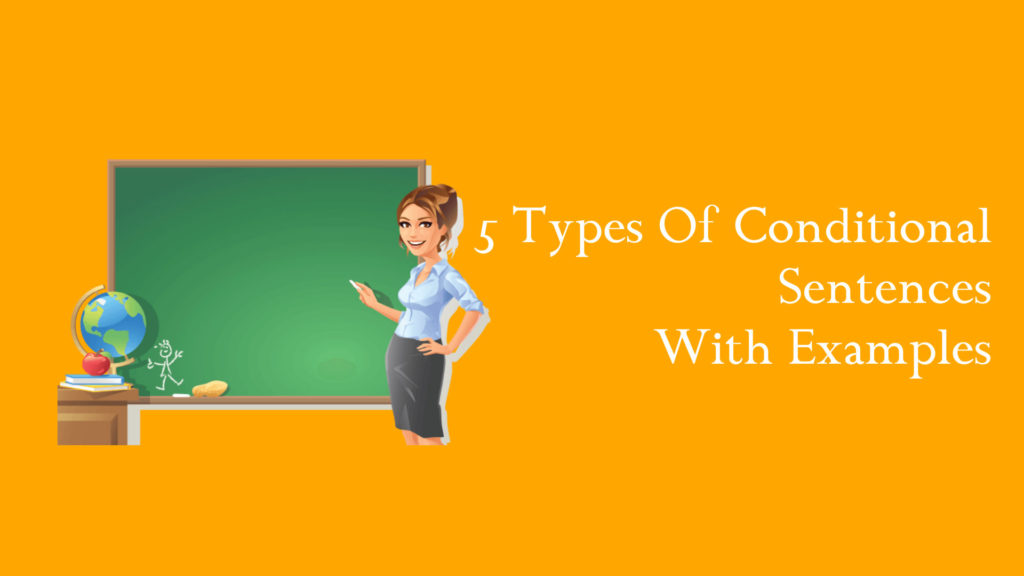In English grammar, we have been learning about Conditional sentences or statements. This time we would dig deep into the concept and know each and everything related to the 5 different types of conditional sentences.

Basically, the conditional sentences express the condition or situation in which there is something happening. The conditional sentences show the various cause and effects of the situation in the form of ‘if-then’ sentences or statements. The most important thing to remember here is that with every conditional sentence there would be a clause that would begin with ‘if’.
While using conditional sentences, you can express various things or situations in which you can expect some events to happen, or what might happen only in certain circumstances.
If you observe carefully, a conditional clause will always have an if clause and the main clause. You might sometimes observe that the order is being changed but the meaning of the sentence remains the same. Let’s explore some examples to get a better understanding.
- I would not be working here if you never suggested me this place.
- If the opportunities are knocking at your door, always welcome it.
- If you care for the pets, feed them well.
- You should never be shy if you are negotiating with clients.
Two Parts Of an If Conditional Sentence
In a conditional statement, there are generally two clauses – the conditional clause and the main clause. Both clauses rely on each other to bring out the complete meaning of the sentence. The conditional clause is the dependent clause and the main clause is the independent clause.
The conditional clause is the dependent clause and it will begin with ‘if’.These sentences begin with ‘if’ because they specify or express the condition.
For instances, check out these ‘if’ clauses
- If I get late to the job…
- If it is really important….
- If you can help….
- If I don’t complete my work on time….
When a clause is beginning with if, then it is depending on more information which needs to be completed. So a dependent clause needs the main clause to be completed.
Main Clause:
It is the clause that will aim to provide the rest of the information to complete the sentence. This is an independent clause which states the result of the various conditional clause. Let’s complete the ‘If’ clause with the main clause.
- If I get late to the job, they would fire me.
- If it is really important, I would complete the reservation by today itself.
- If you can help me, I would get there early.
- If I don’t complete my work on time, my teacher would punish me.
Different Types Of Conditional Sentences
In English grammar, conditional sentences are categorized into different situations.
- Zero Conditional
- First Conditional
- Second Conditional
- Third Conditional
- Mixed Conditional
These conditionals are categorized on the basis of time, the likeliness of occurring and other factors.
1. Zero Conditional
In this type of conditional sentence, the sentences would be expressing some real conditions for all the things that are happening and not just hypothetical. They are considered to be true and will happen with certain conditions or circumstances. It works with only past and present forms and not with the future forms. They are sometimes called Type 0 If Conditional Sentences.
2. First Conditional
Basically, in the first condition, you share the result of the situation and this situation is quite likely to happen in the near future. You would observe that the conditional clause will take the form of the present simple and the main clause will take the form of the future tense.
- If I sleep now, I will be up all night.
- If I do well on all the GRE exam, I could go to Harvard easily.
- If you take the NH-8 highway, you might hit traffic through the main road.
- If Mohan likes cookies, you should bake some for him and pack it.
The first conditional sentences show a possible situation, therefore they are called real conditionals.
3. Second Conditional
In the second conditional, you can see that the possible outcome would occur in the present or future tense. It will generally reflect the idea of “If and But” sentences. The conditional clause is in the past simple and the main clause would be in the future tense. They sometimes called ‘Type 2 If Clauses‘.
- If you slept until 5 pm in the evening, you shouldn’t be tired.
- If you did well on the GRE exam, you will get accepted in most of the universities.
4. Third Conditional
With the third conditional sentences, you would need to contemplate different things that could happen if things were different in the past. The conditional sentence would be in past perfect and main sentence in the perfect tense.
- If you are going to bed on time, you would be having a good rest.
- If you had done well on the GRE exams, you would have been accepted in most of the universities.
5. Mixed Conditionals
In mixed conditionals, you can mix various tenses to express the conditions. It will help the sentences to reflect all the things that did not happen in the past which are still relevant in present and also in the future.
- If I hadn’t slept till 5 in the evening, I would be very tired.
- If I had made more cookies for Mohan, he would be eating them.
There are two types of mixed conditionals namely
- Mixed Third/ Second Conditional
- Mixed Second/ Third Conditional
Final Words:
I know it is quite confusing at a first glance. You can keep this guide handy for your future references.
Keep exploring EnglishBix to learn more about different grammar concepts.

